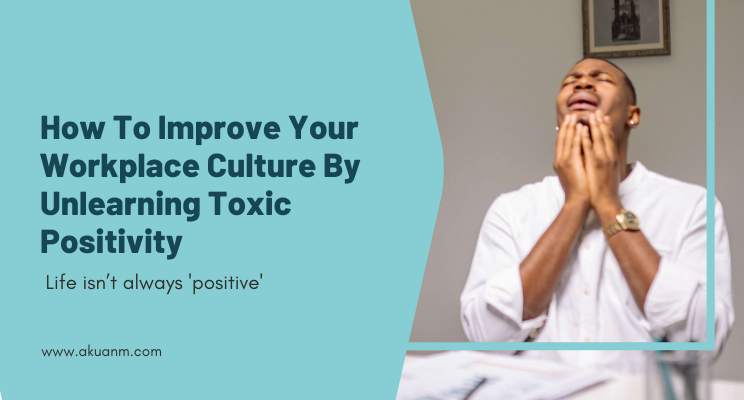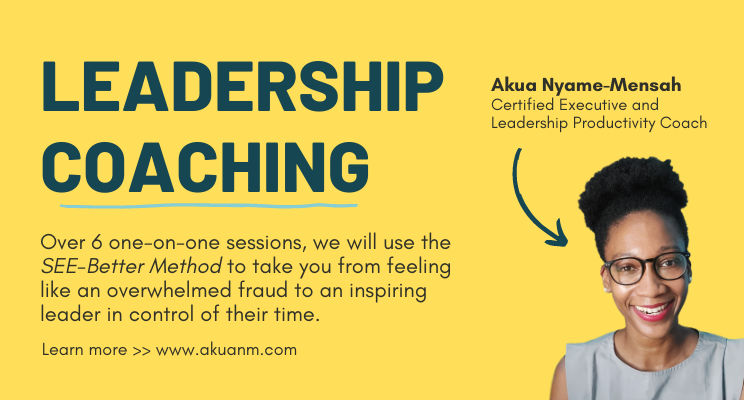How To Improve Your Workplace Culture By Unlearning Toxic Positivity

As a leader, you probably hear time and time again about the importance of having a growth mindset. We’re told that it’s important to have a positive outlook and to be able to shift our perspective.
But is it ever possible to take it too far?
In my opinion, it definitely is. When we take these ideas too far, we wander into the realm of toxic positivity.
Denying reality and forcing ourselves to be “positive” all the time can have detrimental effects.
As leaders, it’s crucial that we learn about toxic positivity. Because at the end of the day, we’re managing PEOPLE.
And people come with these complicated things called feelings.
We can’t just sweep them under the rug.
The reality is, life isn’t always positive.
While I consider myself a generally positive person - I’m smiley, cheerful, and like to look on the bright side - I’m also a realist.
And something I’m working on dealing with is those “negative” emotions that so many of us feel we don’t have the right to express.
It makes complete sense when you think about it.
How many times did you hear things like this growing up 👇🏾
“Just be happy”
“It could be so much worse!”
“You should be grateful”.
These are all examples of toxic positivity.
Certain times call for us to be positive as leaders. But other times, positivity can also be harmful - especially when it's insincere, forceful, or delegitimizes feelings of anxiety, fear, sadness, or hardship.
Our team will often come to us with valid feelings and concerns, and it is up to us to hear them out, NOT minimize them.
Keep reading to learn more about toxic positivity and how you can eliminate it from your workplace culture.
What is toxic positivity?
Let’s start by defining exactly what toxic positivity is. In my research, I found a couple of definitions I found particularly helpful.
The first one, by Healthline, states that toxic positivity is the assumption, either by oneself or others, that despite a person's emotional pain or difficult situation, they should only have a positive mindset or positive thoughts.
Have you ever felt like you had to have a “good vibes only” attitude? By telling people they can only have a “positive vibe”, we’re unconsciously telling them that their other feelings are not valid.
Another definition of toxic positivity is the following, by The Psychology Group:
Toxic positivity is the excessive, inefficient, and ineffective overgeneralization of a happy, optimistic state, across all situations. The process of toxic positivity results in the denial, minimization, and invalidation of the authentic human emotional experience.
With toxic positivity, negative emotions are seen as inherently bad.
We feel like we MUST be positive at all times - no exceptions.
We must remember: we are human beings living a human experience. Not every emotion we experience will be a positive one.
Learning to deal with the range of emotions is key to successfully showing up for ourselves and others.
What does toxic positivity lead to?
Here are just a few of the ways toxic positivity might be showing up in your life:
- Masking your feelings
- Trying to “just get on with it”
- Dismissing or minimizing the feelings of others
- Feeling guilty for having emotions
- Shaming or chastising other people for how they express their emotions
- Brushing things off
If you’re ready to dive deeper into eliminating toxic positivity from your life and workplace culture there are four very important things to keep in mind. Let’s explore them.
How can we unlearn toxic positivity?
Follow these four steps to start unlearning toxic positivity in your life.
1. Build awareness
In order to properly deal with tougher emotions, we need to create awareness around them. This might seem simple, but for many of us, it’s actually incredibly difficult.
So many of us think of emotions as either happy or sad. Good or bad. We lack nuance in our conversations around emotions.
In reality, there is a whole spectrum of emotions.
The first step is becoming aware of this spectrum.
When we gain awareness, we stop:
- Denying our feelings
- Judging our feelings or those of others
- Shaming ourselves for having “negative” experiences
Emotions come and go. So get to know them, recognize them, and create awareness so you can grow.
2. Learn how to name your emotions.
Once you create awareness around the fact that there's actually an entire spectrum of emotions, it's time to get better at naming these more nuanced emotions.
There is so much power in being able to say, "I feel guilty” or “I feel elated” or “I feel fearful”.
The key here is to recognize that there is a much larger vocabulary you can use to discuss your emotions. You don't need to limit yourself to happiness and sadness.
There's also power in realizing that you can feel more than one thing at a time. You can feel sad AND still feel grateful. You can feel frustrated and still feel appreciative. Our emotions don't have to cancel each other out.
3. Work through your emotions in a constructive way.
The third important step is to start thinking about how you can work through your emotions in a constructive and sustainable way. If you're looking for extra support in this area, check out this blog I wrote on how to improve emotional intelligence so you can work through negative emotions.
The key thing here is to figure out strategies that work for YOU.
Maybe that’s meditation or journaling.
Maybe that’s dance, movement, or running.
Whatever strategy you use, make sure you focus on letting out your emotions rather than denying them or stuffing them inside.
4. Focus on truly LISTENING to others.
The fourth step pertains to how we relate with others. When listening to others and showing support, there are certain things we want to keep in mind.
When someone comes to us as they are dealing with difficult emotions or a tough situation, we want to be extremely careful with our choice of words.
For example, if we have a team member who is underperforming and they are also going through some tough emotions about their performance - we need to be conscious of our words.
We want to encourage them to work through their emotions, instead of shutting down.
Avoid using phrases such as, “you just need to step it up”, “you should really be more positive!” or “just get on with it!”.
These kinds of phrases can actually do more harm than good.
Instead, you could replace some of these phrases with sentiments such as:
- I'm listening
- I'm here for you
- I hear you
- Your feelings are valid
By using these types of phrases you'll create empathy, and develop a stronger bond with your team member. They'll feel like they can actually come to when they're struggling, rather than feeling like they need to hide their true emotions. This leads to a workplace culture of transparency and honesty, where folks feel like they can truly rely on one another.
Remember, emotions are an inevitable part of life and an inevitable part of business. We might as well learn to deal with them so we can create the best workplace culture possible. As leaders, if we can master unlearning toxic positivity in ourselves we can model this healthy behavior for the rest of our team.
I’d love to hear from you. How has toxic positivity shown up in your workplace and/or personal life? Tell me in the comments.
P.S. Do you want MORE support to becoming the best leader you can be? Explore my 1-1 leadership coaching program here.
. . .
If you have made it all the way here and want more, learn the first steps to take towards becoming a more focused leader by completing my FREE quiz here.
Found it helpful? Make sure you subscribe to my FREE weekly newsletter to help you stay focused and productive here.
💪 Are you ready to learn how to better engage with your team AND yourself? Apply to work with me here.
👥 Ready to create a more inclusive and engaging team or community? Learn about my workshops here.
Leaders aren't born; they're made.
This 5-minute assessment will help you understand what leadership stage you're currently in so you can determine your next steps.
© Copyright 2023, Akua Nyame-Mensah | Terms & Conditions | Website by Rachelle Deem



0 comments
Leave a comment